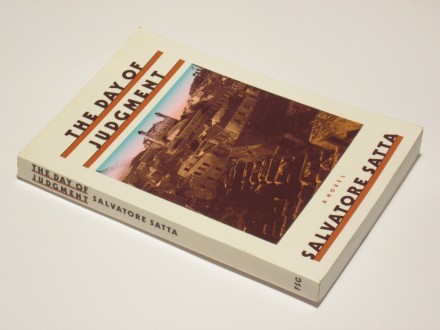Salvatore Satta - The Day of Judgment
| Cena: |
| Stanje: | Polovan bez oštećenja |
| Garancija: | Ne |
| Isporuka: | Pošta CC paket (Pošta) Post Express Lično preuzimanje |
| Plaćanje: | Tekući račun (pre slanja)
Lično |
| Grad: |
Beograd-Zvezdara, Beograd-Zvezdara |
ISBN: 0374526605
Godina izdanja: 2016
Jezik: Engleski
Autor: Strani
Salvatore Satta - The Day of Judgment
Farrar, Straus and Giroux, 2016
298 str.
meki povez
stanje: dobro
Translator: Patrick Creagh
First published in Italy in 1977, The Day of Judgment remains one of the great 20th-century novels, praised by Bruce Chatwin, among others, for its “tremendous evocation of place”. Nuoro is a Sardinian town high in the remote Barbagia mountains, where the locals dress in life-denying black, and seem motivated by nothing but an “accursed will to live”. ...The Financial Times
At precisely nine o`clock, as he did every evening, Don Sebastiano Sanna Carboni pushed back his armchair, carefully folded the newspaper which he had read to the very last line, tidied up the little things on his desk, and prepared to go down to the ground floor...
Around the turn of the twentieth century, in the isolated Sardinian town of Nuoro, the aristocratic notary Don Sebastiano Sanna reflects on his life, his family`s history and the fortunes of this provincial backwater where he has lived out his days.
KIRKUS REVIEW
A novel by a distinguished Italian jurist, found and published only after his death in 1975, that the publisher is funding in some ways comparable to Lampedusa`s The Leopard--and, for a change, the comparison has merit. Satta`s world is crammed tight into the physically negligible Sardinian village of Nuoro--and he returns in this book of old age to remember just about everything, to hide nothing and, in a sense, to forgive it all as well. Don Sebastiano Sanna is the ruling aristocrat of Sanna, and he has missed nothing that has gone on, while at the same time he`s been powerless to change any of it. Barriers between rich and poor, for instance, hold no sentimental value for either Sanna or Satta (". . .poverty creates around itself an aura of poetry, but it erects a barrier against the world, which is rich by nature"); nor is he any less cynical about schoolteachers or the clergy (there`s a wonderful portrait of a drunken schoolmaster; a sumptuous one of a canny, wordly first Bishop of the town, Monsignor Dettori). Unlike Lampedusa`s book, little is narratively continuous about Satta`s except the authorial voice: weary and amused and epigrammatic. Nuoro is invested with no magic other than its own rich confusions and intimate patterns; yet, though standing for nothing larger than itself, it still seems very large indeed when turned by the inexorable wheel of Satta`s fine prose (in a superior translation by Patrick Creagh).
Fiction
Plaćanje pouzećem i postnetom za sada nisu opcija.
Lično preuzimanje je isključivo na Konjarniku uz prethodni dogovor.
Hvala na razumevanju.
Predmet: 76438733







